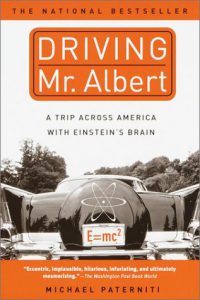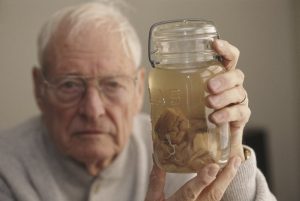Aperio ePathology Scans Slides of Einstein’s Brain
For more information the strange tale of Einstein’s brain, the pathologist who performed his autopsy at Princeton in 1955, recommend reading “Driving Mr. Albert“ or “Possessing Genius: The Bizarre Odyssey of Einstein’s Brain” and you can begin to see how it took over 50 years to collect slides to actually scan.
or “Possessing Genius: The Bizarre Odyssey of Einstein’s Brain” and you can begin to see how it took over 50 years to collect slides to actually scan.
Aperio ePathology, a leader in providing global pathology solutions, has digitized over 550 slides of Einstein’s brain enabling researchers, scientists and enthusiasts around the world to view the original slides prepared by Dr. Thomas Harvey, the pathologist who conducted the autopsy of Albert Einstein in 1955.
The remarkable collection of slides was donated to the National Museum of Health and Medicine (NMHM) in Silver Spring, MD after the pathologist’s death. “The museum has a mission to preserve and protect this collection while facilitating its safe, responsible and scholarly study,” said Dr. Michael Doyle, Founder and Board Chairman of the National Museum of Health and Medicine Chicago.
 The Einstein Brain Atlas app for iPad was developed for NMHM Chicago by Tyler, TX-based Eolas Technologies Inc. The app
The Einstein Brain Atlas app for iPad was developed for NMHM Chicago by Tyler, TX-based Eolas Technologies Inc. The app allows neuroscientists, researchers, educators and others interested in science to explore sections of the Nobel Prize-winning physicist’s brain in microscopic detail. All profits from app sales are being donated by Eolas to support both museums.
allows neuroscientists, researchers, educators and others interested in science to explore sections of the Nobel Prize-winning physicist’s brain in microscopic detail. All profits from app sales are being donated by Eolas to support both museums.
“By working with Leica Biosystems’ Aperio ePathology technology, we’ve been able to capture the vast amount of information contained in the slides at a resolution high enough so that the slides can be stored safely away while the data can be made available to everyone,” said Doyle.
About two-thirds of the total slides from the Einstein brain collection have been released to the public. Work is currently underway to release the remaining images in coming months.
NMHM Chicago chose Leica Biosystems’ Aperio ePathology for its best-in-class scanning and sharing solutions. “We are honored to be involved with the digital preservation of such an important historical artifact,” said Dr. Jared Schwartz, Chief Medical Officer of Leica Biosystems. “But this is not just about preservation. Our solutions support sharing and collaboration for researchers around the world and also eliminate slide shipping costs, travel time and the risk of damaging or losing the slides.”
The collaborative work that made this momentous project possible, and how ePathology will enable quantitative studies of Einstein’s digitized brain, will be featured by Leica Biosystems at the upcoming Society for Neuroscience international annual meeting in San Diego, CA, on November 9-13.
The digitization project was funded by the Buonacorsi Foundation, which supports projects in the arts
Source: Leica Biosystems
































